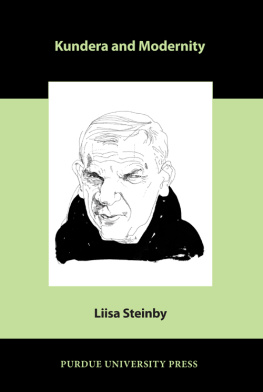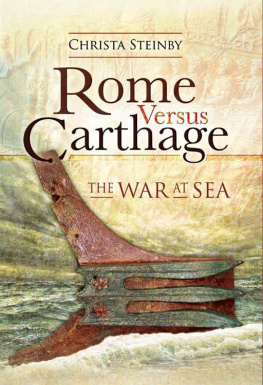Kundera and Modernity
Comparative Cultural Studies
Steven Ttsy de Zepetnek, Series Editor
The Purdue University Press monograph series of Books in Comparative Cultural Studies publishes single-authored and thematic collected volumes of new scholarship. Manuscripts are invited for publication in the series in fields of the study of culture, literature, the arts, media studies, communication studies, the history of ideas, etc., and related disciplines of the humanities and social sciences to the series editor via email at <>.
Volumes in the Purdue series of Books in Comparative Cultural Studies include
Liisa Steinby, Kundera and Modernity
Text and Image in Modern European Culture, Ed. Natasha Grigorian, Thomas Baldwin, and Margaret Rigaud-Drayton
Sheng-mei Ma, Asian Diaspora and East-West Modernity
Irene Marques, Transnational Discourses on Class, Gender, and Cultural Identity
Comparative Hungarian Cultural Studies, Ed. Steven Ttsy de Zepetnek and Louise O. Vasvri
Hui Zou, A Jesuit Garden in Beijing and Early Modern Chinese Culture
Yi Zheng, From Burke and Wordsworth to the Modern Sublime in Chinese Literature
Agata Anna Lisiak, Urban Cultures in (Post)Colonial Central Europe
Representing Humanity in an Age of Terror, Ed. Sophia A. McClennen and Henry James Morello
Michael Goddard, Gombrowicz, Polish Modernism, and the Subversion of Form
Shakespeare in Hollywood, Asia, and Cyberspace, Ed. Alexander C.Y. Huang and Charles S. Ross
Gustav Shpets Contribution to Philosophy and Cultural Theory, Ed. Galin Tihanov
Comparative Central European Holocaust Studies, Ed. Louise O. Vasvri and Steven Ttsy de Zepetnek
Marko Juvan, History and Poetics of Intertextuality
Thomas O. Beebee, Nation and Region in Modern American and European Fiction
Paolo Bartoloni, On the Cultures of Exile, Translation, and Writing
Justyna Sempruch, Fantasies of Gender and the Witch in Feminist Theory and Literature
Kimberly Chabot Davis, Postmodern Texts and Emotional Audiences
Philippe Codde, The Jewish American Novel
Deborah Streifford Reisinger, Crime and Media in Contemporary France
Imre Kertsz and Holocaust Literature, Ed. Louise O. Vasvri and Steven Ttsy de Zepetnek
Camilla Fojas, Cosmopolitanism in the Americas
Comparative Cultural Studies and Michael Ondaatjes Writing, Ed. Steven Ttsy de Zepetnek
Kundera and Modernity
Liisa Steinby
Purdue University Press
West Lafayette, Indiana
Copyright 2013 by Purdue University. All rights reserved.
Printed in the United States of America.
Library of Congress Cataloging-in-Publication Data
Steinby, Liisa.
Kundera and Modernity / Liisa Steinby.
p. cm. (Comparative cultural studies)
Includes bibliographical references and index.
ISBN 978-1-55753-637-2 (pbk.) ISBN 978-1-61249-247-6 (epdf) ISBN 978-1-61249-248-3 (epub) 1. Kundera, MilanCriticism and interpretation. 2. EuropeIntellectual life20th century. 3. Modernism (Literature)Europe. 4. Existentialism in literature. I. Title.
PG5039.21.U6Z88 2013
891.8685409dc23
2012029233
Cover image: Milan Kundera (2007)
Drawing by Joseph Ciardiello
Purdue University Press thanks the artist for the copyright release of the drawing.
To Magnus
Acknowledgments
Milan Kunderas oeuvre first raised my interest when in the late 1980s I was working on a book about the postmodernist novel, which I interpreted as postindividualistic. Postindividualistinen romaani (The Postindividualistic Novel) was published in 1992, and in 1994 a German translation followed, entitled Der postindividualistische Roman, both under my then surname Saariluoma. At the time of my research for the book I intended to include analyses of Kunderas novels, but soon noticed that he does not fit in the framework I developed for the analysis. His novels do not fit because he is not a postmodernist (or postindividualistic) writer, but a late representative of modernist thinking in the novel. A year as a senior research fellow at the Academy of Finland enabled me to continue my analysis of Kunderas work and Milan Kundera, viimeinen modernisti (Milan Kundera, the Last Modernist) was published in 2005, of which Kundera and Modernity is a substantially revised and updated version. I thank the publisher, Faros, and its director Hannu Salmi, for the copyright release for the English version of the book.
I thank my colleagues, who encouraged and helped me in preparing Kundera and Modernity, above all Kbra Ataman-Outinen, Viola Parente-apkov, and Edith Ulmer. My special thanks go to the always friendly and helpful staff of Turku University Library, without whose assistance this book would not have been possible. I am grateful to Ellen Valle, who assisted me in the revision of my English translation of the Finnish original. My spouse, Magnus Steinby, encouraged and supported me in every possible way. I thank the anonymous reviewers of the English manuscript for their comments to improve my work. Last but not least I thank the editor of the Purdue University Press monograph series of Books in Comparative Cultural Studies, Steven Ttsy de Zepetnek, not only for accepting the book into his series, but also for his help in revising the book for publication.
Liisa Steinby, Turku 10 July 2012
Chapter One
Kundera, a European Novelist
Milan Kundera (born in 1929) is one of the most prominent and widely read authors in contemporary France and is also acknowledged by an international reading public. This apparently simple statement is not, however, free of paradox: paradoxes are apparently not only a distinctive feature of Kunderas fiction, but also characterize his image as an author and the reception of his works. It is arguable whether Kundera, who in 1975 emigrated from Czechoslovakia to France and who until the early 1990s wrote his novelswhich are mostly set in Czechoslovakia or in the circles of Czechoslovak migr(e)sin Czech, should be called a French author at all. Calling him a Czech author, however, is no less problematic. From the very beginning, he refused the label of Czech emigrant dissident, which until 1989 was attached to him frequently (see, e.g., Petras 6970). His irritation stems from the purely political content of the concept of dissident. Kundera does not position himself as a political thinker, but as a novelist, one whose existence implies independent thoughtnot, however, primarily in the sense of a critique of a particular political system, but more generally (see, e.g., Finkielkraut 37; McEwan 24; Petro 82). He compared Western journalismwhich views an East European emigrant author in an exclusively political lightwith the falsifications of Stalinism (see, e.g., OBrien, Meaning 7).
There is, however, more to it than that. Kundera does not want to be regarded as a Czech author, since in his opinion the habit of classifying authors according to their nationality is misguided and he argues that in European literature national boundaries are not essential. He claims to represent European culture as a whole; more specifically, he suggests a cultural division of Europe that he considers more valid than that defined by the borders of nation-states and thinks of himself as representing Central Europe. Prague and Bohemia, as he calls his country of origin, are parts of Central Europe, that is, of the Habsburg Empireparticularly its nineteenth- to the twentieth-century formation, the Austro-Hungarian empirewhich Kundera considers one of the most culturally creative parts of Europe (see, e.g., Kundera,










